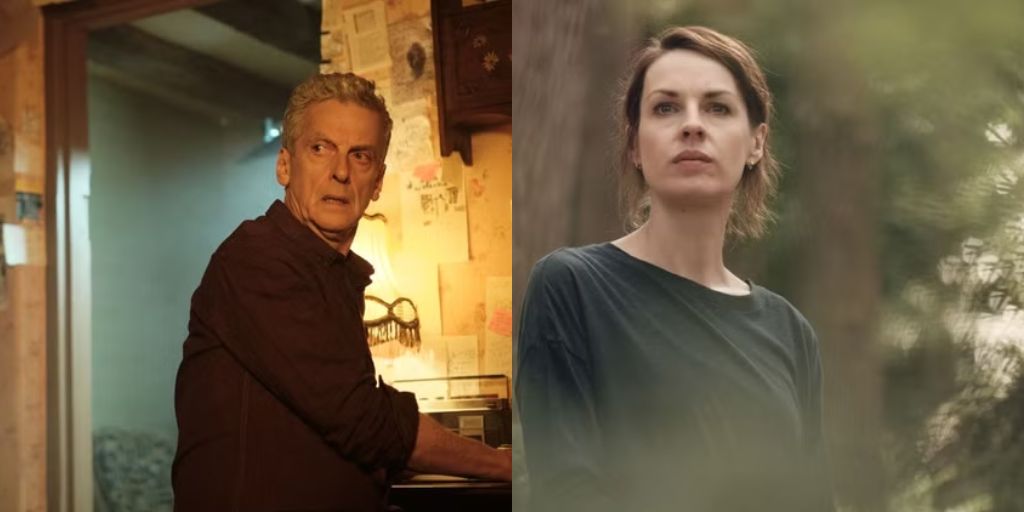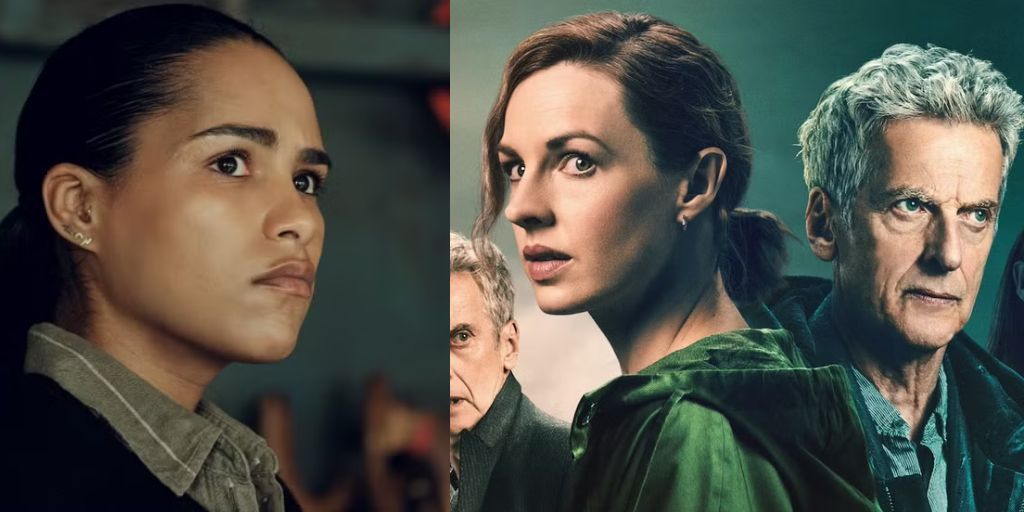There’s not a lot of TV I keep up with anymore, mainly because it now takes more than two years to make new seasons.
You’d think that being a TV critic would give me the time and energy to watch everything, but even with all the time in the world, it’s getting harder to care about most shows.
The threat of cancellation always hangs over them (looking at you, Netflix). Not only that, but after such a long wait for the next season, I often find that my excitement has faded. A lot can change in two years, and by the time a show returns, I might no longer be interested.
This is what makes a show like The Devil’s Hour such a rare and delightful exception. When the first season of this thriller from Prime Video came out two years ago, I was gripped by its tense atmosphere and smart storytelling.
So, when it was announced that the show was coming back for a second season, I wasn’t sure what to expect. Could it recapture the magic of the first season? Or would the long break make it hard for me to care anymore?
As it turns out, Season 2 of The Devil’s Hour managed to pull me right back in, just as the first season had done. That, to me, is a huge success. For a show to return after such a long time and still have the same emotional impact, that’s rare in today’s world of TV.
The first season of The Devil’s Hour was some of the best television I’ve seen in years. The show managed to mix a deep, slow-building mystery with moments of real terror, and its characters were fully developed, each of them feeling like real people.
The plot was centered around a woman named Lucy Chambers, who was trying to understand a series of strange events happening in her life.
Her son Isaac behaved strangely, waking up every night at exactly 3:33 AM – the so-called “devil’s hour” – and speaking of things that were beyond his years. At the same time, Lucy started having terrifying dreams that seemed connected to a series of murders.
Season 1 ended with several big questions unanswered, and when Season 2 starts, it picks up right where the first one left off.
Lucy, played by Jessica Raine, is now a single mother after her divorce, and she’s dealing with the fallout from her near-death experience in the previous season.
At the end of Season 1, she had a life-changing encounter with a mysterious serial killer named Gideon, played by Peter Capaldi.
He’s not just any killer though; Gideon has lived hundreds of lives and seems to have access to knowledge beyond what normal people can comprehend.
After this encounter, Lucy starts remembering things from what appears to be a past life. These memories come flooding back after she makes a deal with Gideon to save her mother’s life in exchange for stopping a catastrophe. But now, she finds herself in a dangerous situation.
Not only is she trying to protect her son Isaac, who still exhibits strange and eerie behavior, but she’s also left wondering if she can trust Gideon or if he’s leading her into further danger.
The relationship between Lucy and Gideon forms the core of this season’s story, as she tries to figure out how much of what he says can be believed and how much of it is just manipulation.
A New Tone for Season 2: Less Mystery, More Action
If Season 1 of The Devil’s Hour was about slowly unraveling a deep mystery, then Season 2 shifts gears into something a bit different. Instead of the slow-building suspense of the first season, Season 2 moves at a much faster pace.

It becomes more of a race against time, with Lucy and the others trying to prevent a disaster from happening. This change in tone might be surprising for some fans who loved the atmospheric feel of the first season, but it doesn’t mean the show has lost its edge.
In fact, the new, faster pace brings its own kind of excitement. While the show still has the same dark, moody feeling, it’s now more of a step-by-step process to prevent something terrible from happening.
The tension is still there, but it’s driven more by the urgency of the situation rather than by a slow buildup of dread.
Lucy finds herself pulled into a dangerous game where every move counts, and she has to stay one step ahead to keep herself and her loved ones safe.
Some viewers might find the shift in tone confusing. If you’re expecting Season 2 to be an exact copy of Season 1, you might walk away feeling a little lost. Prime Video’s marketing hasn’t exactly helped either.
For instance, they heavily promoted Ted Lasso’s Phil Dunster as a major part of the cast this season, but in reality, he only appears in one brief scene in the first episode. It’s a bit misleading, especially for fans of Dunster who might have been expecting more from him.
Despite the shift, the core elements that made Season 1 so engaging are still present. The story remains tightly focused on Lucy and her journey, and the new direction of the plot makes sense in the broader context of her character’s development.
Creator Tom Moran clearly has a plan for how this story will unfold, and it never feels like the show is just making things up as it goes along.
Even when the plot becomes complex and a bit hard to follow at times, you get the sense that all the pieces will eventually come together.
A Puzzle of a Show: Keeping Track of the Details
One of the things that makes The Devil’s Hour stand out is how much attention it demands from its audience.
This isn’t a show you can just casually watch while doing something else. The plot is full of twists and turns, and it requires you to pay close attention if you want to keep track of everything that’s happening.
Personally, I found myself taking notes as I watched, trying to make sense of the different layers of the story. And even then, I still had questions by the end of some episodes.
This complexity is part of what makes the show so rewarding. It’s not just a straightforward mystery or thriller. It’s more like a puzzle that you have to figure out alongside the characters.
As Lucy tries to piece together the fragments of her past and present, you’re right there with her, trying to make sense of the clues and figure out what’s real and what’s not.
The show plays with your expectations, leading you down one path only to reveal something unexpected later on.
In many ways, The Devil’s Hour is a show that challenges its audience. It doesn’t spoon-feed you answers or neatly wrap up every storyline.
Instead, it leaves you with lingering questions, encouraging you to think critically about what you’ve just watched. Some viewers might find this frustrating, but for those who enjoy a show that makes them think, it’s one of the series’ biggest strengths.
Peter Capaldi Shines as Gideon
Peter Capaldi’s performance as Gideon is one of the highlights of the show. Capaldi has always been an actor who brings depth and complexity to his roles, and his portrayal of Gideon is no different. Gideon is not your typical serial killer. He’s not driven by the usual motives of greed or revenge.
Instead, there’s something almost otherworldly about him. He speaks in cryptic riddles, and it’s clear that he knows far more than he lets on.
Capaldi’s performance gives Gideon a sense of mystery and menace that keeps you guessing about his true intentions. Is he trying to help Lucy, or is he manipulating her for his own purposes? Even after two seasons, it’s still not entirely clear.
Capaldi plays the role with a quiet intensity, making Gideon both terrifying and oddly sympathetic at the same time. You get the sense that he’s seen and experienced things beyond human comprehension, and that makes him both fascinating and frightening.
One of the best aspects of Capaldi’s performance is how he balances Gideon’s cold, calculating nature with moments of real vulnerability. There are times when you almost feel sorry for him, as if he’s trapped in some kind of cosmic game that he can’t escape from. It’s this complexity that makes Gideon such a compelling character and keeps you invested in his story, even as you question his motives.
Strong Supporting Cast Upgrades the Show
While Capaldi steals the spotlight, the rest of the cast also delivers strong performances. Jessica Raine is excellent as Lucy, bringing a mix of strength and vulnerability to her character.
Lucy is a woman who’s been through a lot, and Raine does a great job of showing the emotional toll that these events have taken on her.
She’s not just a victim of circumstance; she’s actively trying to understand what’s happening to her and take control of her life, even when the odds are stacked against her.
Nikesh Patel also deserves praise for his role as DI Dhillon. In Season 2, his character takes on a more prominent role, and Patel rises to the occasion with a performance that’s both charismatic and grounded.
Dhillon is a no-nonsense detective, but he’s also compassionate, and Patel brings out both sides of the character. His chemistry with Raine adds another layer to the story, especially as their characters’ relationship becomes more complicated.
Young actor Benjamin Chivers, who plays Lucy’s son Isaac, continues to impress as well. Isaac’s strange behavior and eerie wisdom make him a key figure in the story, and Chivers handles the role with maturity beyond his years.
His performance adds an unsettling quality to the show, reminding you that there’s something much bigger and darker at play.
A Complex, Thought-Provoking Thriller
By the end of Season 2, The Devil’s Hour leaves you with more questions than answers, but that’s part of its charm. This is not a show that gives you easy solutions or neat conclusions.
Instead, it forces you to think about the choices the characters have made and the consequences of those choices. It’s a show that doesn’t shy away from the messiness of life, and that makes it all the more engaging.
Even though the plot can be difficult to follow at times, the show never loses sight of its central themes. At its core, The Devil’s Hour is about the choices we make and the ripple effects those choices have on our lives and the lives of others.
It’s a show that asks big questions about fate, free will, and the nature of reality, and it does so in a way that feels both entertaining and intellectually stimulating.
The Devil’s Hour Season 2 is available to stream on Prime Video starting October 18. Whether you’re a fan of the first season or new to the series, this is a show that’s worth your time. Just be prepared to pay close attention — you won’t want to miss a single detail.
Conclusion
The Devil’s Hour Season 2 successfully builds on the tension, mystery, and dark atmosphere that made its first season so attracting. By shifting the tone to a faster, more action-driven pace, the show keeps things fresh while still maintaining the core elements that drew viewers in initially.

The characters, especially Lucy and Gideon, continue to evolve in fascinating ways, and the performances, particularly from Peter Capaldi and Jessica Raine, keep the audience invested in their fates.
Although the plot can sometimes feel overwhelming with its complexity, this only adds to the show’s appeal for those who enjoy layered, thought-provoking storytelling.
The twists and turns force you to pay attention, and even when the story leaves you with questions, it never feels like it’s lost its direction.
The emotional depth and philosophical questions about fate, choices, and consequences make it more than just a thriller – it’s a show that stays with you long after the credits roll.
In a TV show where many shows fade away after a long hiatus, The Devil’s Hour manages to return stronger, more engaging, and more daring than before. It’s a rare and rewarding watch for fans of gripping, smart television.





